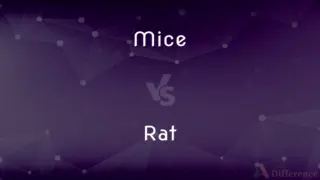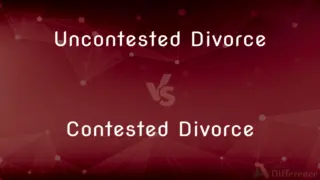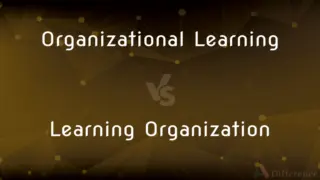Appropriation vs. Misappropriation — What's the Difference?
By Maham Liaqat & Fiza Rafique — Updated on March 19, 2024
Appropriation involves the legal or appropriate use of resources or ideas, often with attribution or permission, while misappropriation refers to improper or unauthorized use of funds, resources, or ideas, typically violating laws or ethical standards.

Difference Between Appropriation and Misappropriation
Table of Contents
ADVERTISEMENT
Key Differences
Appropriation generally refers to the act of allocating or using resources, funds, or ideas in a manner that is considered legal, proper, or fitting within a specific context. For instance, a government might appropriate funds for infrastructure projects, or an artist might appropriate cultural elements with due respect and attribution to create new works. On the other hand, misappropriation is characterized by the unauthorized or unethical use of assets, funds, or intellectual property. This term often implies a breach of trust or violation of legal or ethical boundaries, such as when someone uses company funds for personal expenses without permission.
In the context of intellectual property, appropriation can sometimes involve using existing ideas or creative works to produce new content, provided it falls under fair use or is transformed sufficiently to be considered original. Conversely, misappropriation in this sphere typically involves using someone's ideas, creative works, or innovations without permission, credit, or adherence to legal standards, leading to potential copyright infringement or plagiarism.
The distinction between appropriation and misappropriation can also hinge on consent and intent. Appropriation involves a degree of acceptance or approval from the authority or owner of the resources or ideas, with the intent to use them appropriately or for a mutually agreed purpose. Misappropriation, however, lacks such consent and is often driven by deceptive, fraudulent, or malicious intent, leading to harm or disadvantage to the rightful owner or authority.
In legal and financial contexts, appropriation is a structured and planned process, often documented and transparent, such as budget allocations by governments or organizations. Misappropriation in these contexts is considered a serious offense, involving the illegal or unauthorized diversion of funds, which can lead to legal penalties, including fines and imprisonment.
While the term appropriation can carry negative connotations in certain cultural or creative contexts—criticized for cultural insensitivity or lack of originality when not handled respectfully—misappropriation is unequivocally negative and associated with dishonesty, theft, and violation of trust or legal rights.
ADVERTISEMENT
Comparison Chart
Definition
Legal or proper use of resources or ideas.
Improper or unauthorized use, often illegal.
Context
Can be financial, cultural, or creative.
Often financial, legal, or intellectual.
Key Characteristics
Legal, ethical, with permission or attribution.
Illegal, unethical, without permission.
Intent
To use resources or ideas fittingly or innovatively.
To exploit or divert resources or ideas for unauthorized purposes.
Legal Connotations
Generally positive or neutral, implies structured use.
Negative, associated with theft, fraud, or breach of trust.
Compare with Definitions
Appropriation
Allocation of funds for specific purposes.
The city council's appropriation of funds for the new park was widely supported.
Misappropriation
Embezzlement or theft of funds.
The treasurer was found guilty of the misappropriation of club funds.
Appropriation
Legal borrowing of cultural elements to create new art.
The artist's appropriation of traditional motifs sparked a dialogue about cultural exchange.
Misappropriation
Unauthorized use of intellectual property.
The author sued for misappropriation of her copyrighted work.
Appropriation
Use of existing ideas to inspire innovation.
The startup's appropriation of existing technology for new applications was key to its success.
Misappropriation
Illegal diversion of resources.
Misappropriation of humanitarian aid in conflict zones is a serious concern.
Appropriation
Governmental allocation of resources.
Federal appropriation for disaster relief aided the affected communities.
Misappropriation
Use of someone's ideas without credit.
The scientist accused his colleague of misappropriation of his research findings.
Appropriation
Adoption of certain practices from different cultures.
The appropriation of yoga in Western countries has led to its global popularity.
Misappropriation
Exploitation of cultural symbols without permission.
The fashion brand faced backlash for the misappropriation of indigenous designs.
Appropriation
The act of appropriating.
Misappropriation
In law, misappropriation is the unauthorized use of another's name, likeness, identity, property, discoveries, inventions, etc without that person's permission, resulting in harm to that person. Another use of the word refers to intentional and illegal use of property or funds; it can particularly refer to when done by a public official.
Appropriation
Something appropriated, especially public funds set aside for a specific purpose.
Misappropriation
The action of misappropriating something; embezzlement
An alleged misappropriation of funds
Appropriation
A legislative act authorizing the expenditure of a designated amount of public funds for a specific purpose.
Misappropriation
To appropriate wrongly
Misappropriating the theories of social science.
Appropriation
An act or instance of appropriating.
Misappropriation
To appropriate dishonestly for one's own use; embezzle.
Appropriation
That which is appropriated.
Misappropriation
The wrongful, fraudulent or corrupt use of other's funds in one's care.
Appropriation
Public funds set aside for a specific purpose.
Misappropriation
Wrong appropriation; wrongful use.
Appropriation
(arts) The use of borrowed elements in the creation of a new work.
Misappropriation
The fraudulent appropriation of funds or property entrusted to your care but actually owned by someone else
Appropriation
(sociology) The assimilation of concepts into a governing framework.
Misappropriation
Wrongful borrowing;
His explanation was a misappropriation of sociological theory
Appropriation
In church law, the making over of a benefice to an owner who receives the tithes, but is bound to appoint a vicar for the spiritual service of the parish.
Appropriation
The principle that supplies granted by a legislature are only to be expended in the manner specified by that legislature.
Appropriation
The act of setting apart or assigning to a particular use or person, or of taking to one's self, in exclusion of all others; application to a special use or purpose, as of a piece of ground for a park, or of money to carry out some object.
Appropriation
Anything, especially money, thus set apart.
The Commons watched carefully over the appropriation.
Appropriation
The severing or sequestering of a benefice to the perpetual use of a spiritual corporation. Blackstone.
Appropriation
Money set aside (as by a legislature) for a specific purpose
Appropriation
Incorporation by joining or uniting
Appropriation
A deliberate act of acquisition
Common Curiosities
How is appropriation viewed in the art world?
In art, appropriation can be a creative tool, but it's controversial when it involves taking without respect, acknowledgment, or understanding of the source material.
What measures can prevent misappropriation of funds?
Preventative measures include strict financial controls, audits, and clear ethical guidelines to deter and detect misappropriation.
Is appropriation always legal?
Appropriation is generally legal when done with permission or within the bounds of fair use, though it can be ethically contested in cultural contexts.
Is it misappropriation to use a photo found online for a school project?
Using a photo without permission could be considered misappropriation, especially if the project is published or shared publicly outside of a classroom setting.
How do companies protect against intellectual property misappropriation?
Companies use legal tools like copyrights, patents, and non-disclosure agreements to protect against intellectual property misappropriation.
Can misappropriation lead to legal consequences?
Yes, misappropriation, especially of funds or intellectual property, can result in legal action, fines, and even imprisonment.
Can misappropriation be accidental?
Misappropriation can be accidental, especially in cases of misunderstanding copyright laws or cultural significance, but it still may have legal or ethical repercussions.
Is cultural appropriation considered misappropriation?
Cultural appropriation can be seen as misappropriation when it involves disrespectful or unauthorized use of cultural elements, leading to ethical and social criticisms.
Can misappropriation occur within personal relationships?
Yes, misappropriation can occur in personal contexts, such as when someone uses another's belongings without permission.
Can sharing music online be considered misappropriation?
Sharing copyrighted music without permission can be seen as misappropriation, violating copyright laws.
Are there cultural norms that influence perceptions of misappropriation?
Yes, cultural norms and values can significantly influence what is considered appropriate versus misappropriated, especially in the context of cultural and creative works.
What role does intent play in distinguishing appropriation from misappropriation?
Intent is crucial; appropriation is generally done with respect or legal permission, while misappropriation involves unauthorized use with potential harm or theft.
Can misappropriation affect a company's reputation?
Yes, allegations or instances of misappropriation can significantly damage a company's reputation, leading to public relations challenges and loss of trust.
What is the difference between borrowing and misappropriation in creative work?
Borrowing in creative work typically involves some level of permission or falls under fair use, whereas misappropriation is unauthorized and potentially harmful to the original creator.
How is misappropriation handled in academic settings?
Academic settings address misappropriation, such as plagiarism, with strict policies and consequences to uphold integrity and originality.
Share Your Discovery

Previous Comparison
Foamy vs. Frothy
Next Comparison
Shake vs. NodAuthor Spotlight
Written by
Maham LiaqatCo-written by
Fiza RafiqueFiza Rafique is a skilled content writer at AskDifference.com, where she meticulously refines and enhances written pieces. Drawing from her vast editorial expertise, Fiza ensures clarity, accuracy, and precision in every article. Passionate about language, she continually seeks to elevate the quality of content for readers worldwide.














































